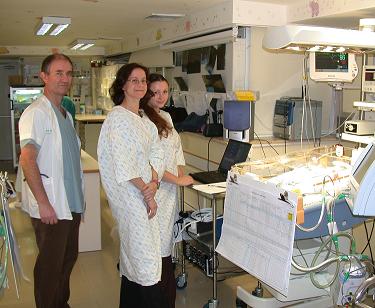The new method is based on the use of tiny external sensors that are attached to both sides of the chest and abdomen of the baby or the small premature baby, and thus it is possible to monitor and test changes in the degree of air entering the lungs or lack of symmetry between the two lungs as a result of the development of a ventilation disorder

At the national annual conference of the Association of Prematurity Physicians (Neontologists), the work presented by Dr. Danny Weissman from the Carmel Hospital won first place as an outstanding work, the project "pneumomonitor" which the work presented is about to be released to the market soon by the manufacturing company. This is a device for testing and continuous monitoring of pulmonary ventilation in premature and ventilated patients designed to save lives.
The new method is based on the use of tiny external sensors that are attached to both sides of the chest and abdomen of the baby or the small premature baby, and thus it is possible to monitor and test changes in the degree of air entering the lungs or lack of symmetry between the two lungs as a result of the development of a ventilation disorder. The sensors are attached to the body from the outside without any invasive intervention.
The system warns of changes in the degree of ventilation of each of the lungs and detects the development of breathing problems in the early stages, even before the development of signs of distress and danger to life due to a disturbance in blood oxygenation. In addition, the system allows identification of the location of the disturbance. The purpose of the system is to speed up the diagnosis and treatment of a respiratory problem even before signs of distress and irreversible damage to the respiratory system have developed, thus increasing the chances of recovery and preventing complications for the patient.
This is a joint research project between the Neonatal and Prematurity Department at the Carmel Medical Center and the Faculty of Biomedical Engineering at the Technion that began about two years ago and led to the development of the new device for continuous and non-invasive respiratory testing and monitoring, which substantially increases the information on the effectiveness of respiration, especially in infants and premature infants.
The project is an initiative of three researchers, Dr. Danny Wiseman from the Neonatal and Premature Intensive Care Department at the "Carmel Medical Center" and the Technion's Faculty of Medicine, Prof. Amir Landsberg and Dr. Carmit Levy from the Technion's Faculty of Biomedical Engineering.
In the first stage, the project started as a topic for a thesis of undergraduate students in the Faculty of Biomedical Engineering and won the first prize in the project competition in the faculty. Development then continued through the start-up company.
The company, "Pneumadicar", began its activities about a year ago in the technological incubator "Yozmat Ha'emek" in Migdal Ha'Emek and in December 2007 the clinical trials began at the "Carmel" Medical Center in Haifa.
As of today, the equipment currently available in the intensive care units in the hospitals in Israel does not perform such monitoring and sometimes precious time passes, from the moment a problem arises in the visibility ventilation until it can be located with the help of the existing means.
The systems that are currently part of the existing ventilators, or systems that check the level of oxygenation in the blood, heart rate and blood pressure, do not directly monitor the efficiency of breathing and do not immediately report the formation of a problem, as the new "pneumomonitor" system does.
After experiments on laboratory animals were successfully completed and an initial device was developed, and after the necessary approvals were received from the hospital and the Ministry of Health, the first clinical trial is nearing completion as part of Pegia at the Carmel Medical Center, managed by Dr. Avi Rothschild. The results are extremely encouraging and guarantee the completion of the development of the miniaturized device within the coming year.
The research work was presented by Dr. Danny Wiseman from the Carmel Hospital last month also at an international conference of the Sociedad Iberoamericana de Neonatologia (SIBEN), in the city of "Mar del Plata" in Argentina and evoked enthusiastic reactions from colleagues in the profession from different countries. The organization unites neonatologists from America and Spain and created a common network for international cooperation to promote the care of newborns and premature babies.
